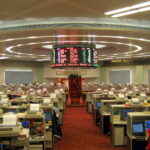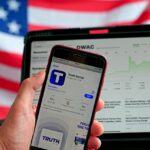Wall Street banks have reaped the benefits of US President Donald Trump’s new tariff campaign. The renewed campaign has shaken markets and stressed corporate nerves.
Investors scrambled for a new position in their portfolios as geopolitical tensions, trade uncertainties and rising geopolitical risks impacted the earnings of major US banks.
Bank of America has surpassed analysts’ predictions, as have Goldman Sachs JPMorgan Chase Morgan Stanley and Citi. They cite increased customer activity and the market fluctuations for their revenue growth.
Bank of America beats forecasts, as do Citi and Goldman Sachs
Bank of America announced on Tuesday its equity trading revenues rose by 17%, to $2.2 billion. This was slightly higher than expected.
The Fixed Income Trading brought in $3.5 Billion, which is also above expectations.
The bank reported a profit of $7.4 Billion, which is 90 cents per share. Revenues increased by nearly 6%, to $27.51 Billion.
Citigroup’s equity trading revenues also grew sharply, up 23% at $1.5 billion. This was due to the “increased volatility of markets” and increased client activity.
The bank was able to beat its revenue expectations despite the broader economic uncertainties.
Goldman Sachs reported earnings the day before and saw its equities-trading revenue increase 27%, to $4.19 Billion, or roughly $540 Million above expectations.
The overall revenue grew 10%, to $10.71 Billion. This was largely due to gains made in trading and investment banking.
According to the bank, a rise in trading revenues in the third quarter was offset by a small decline in revenue from asset and wealth-management services compared to a year ago.
JPMorgan Chase’s revenue grew by 8% to $46.01 Billion. The trading revenue alone grew by 48%, to $3.8 Billion. This was again above Wall Street’s expectations.
Morgan Stanley also had a good quarter with its equity trading revenues up by 45%, to $4.13 Billion.
Total earnings for the bank rose by 26%, to $4.32 Billion or $2.60 a share.
Investment banking activity has been muted due to volatility
Bank chiefs warned against a bullish outlook despite the good financial results.
Jamie Dimon, CEO of JPMorgan Chase said: “The economy faces considerable turmoil. Tax reform and deregulation could be positive for the economy. But tariffs and wars can also have negative effects.”
As always, while we wish for the best, the firm is prepared for all possible scenarios.
Goldman Sachs’ CEO David Solomon warned in a similar way that the environment for business had dramatically changed since the start of this year.
Solomon stated that “Our clients are worried about the near-term and long-term uncertainties, which have impacted their ability to take important decisions.”
Solomon shared the same concerns as his colleagues at JPMorgan, Morgan Stanley and noted that increased market volatility has caused corporate clients to postpone or reconsider their plans for deal making.
He told analysts that the volatility in the investment banking sector had led to a more subdued activity than what we expected at the beginning of the year.
The familiar pattern of chaos
It is important to note that the current trade windfall has not been unheard of before.
In the past, during periods of economic and geopolitical stress, capital market operations at banks have seen an increase in their trading revenues.
Goldman Sachs reported a 17 percent increase in its equity trading revenues from the previous year, and JPMorgan, Morgan Stanley, as well, benefited.
Trading desks took advantage of extreme swings in the market during Brexit in 2016, and in the first months following the COVID-19 Pandemic.
JPMorgan’s revenue from markets and securities increased 77% in Q2 2020. Citigroup’s revenue for equity trading grew 41%.
Investors quickly adjusted to the economic shock caused by the pandemic, and trading volume reached record levels.
As new information becomes available, the post Wall Street banks benefited from Trump’s tariff turmoil as volatility in equity trading revenues increased may be updated.
This site is for entertainment only. Click here to read more






